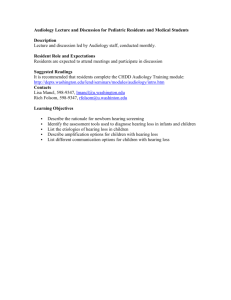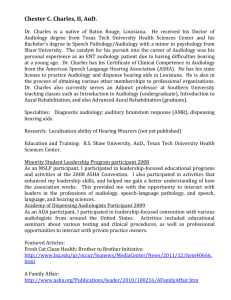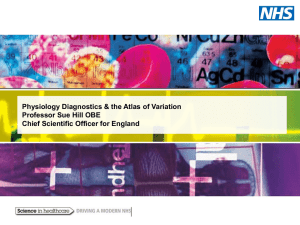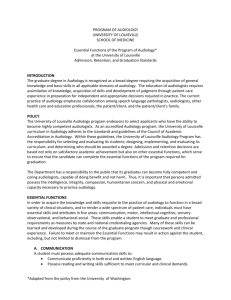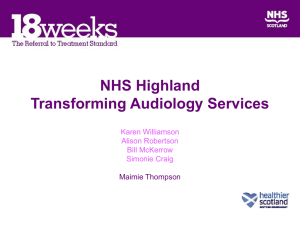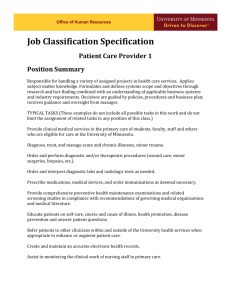Word 316 KB - MBS Online
advertisement
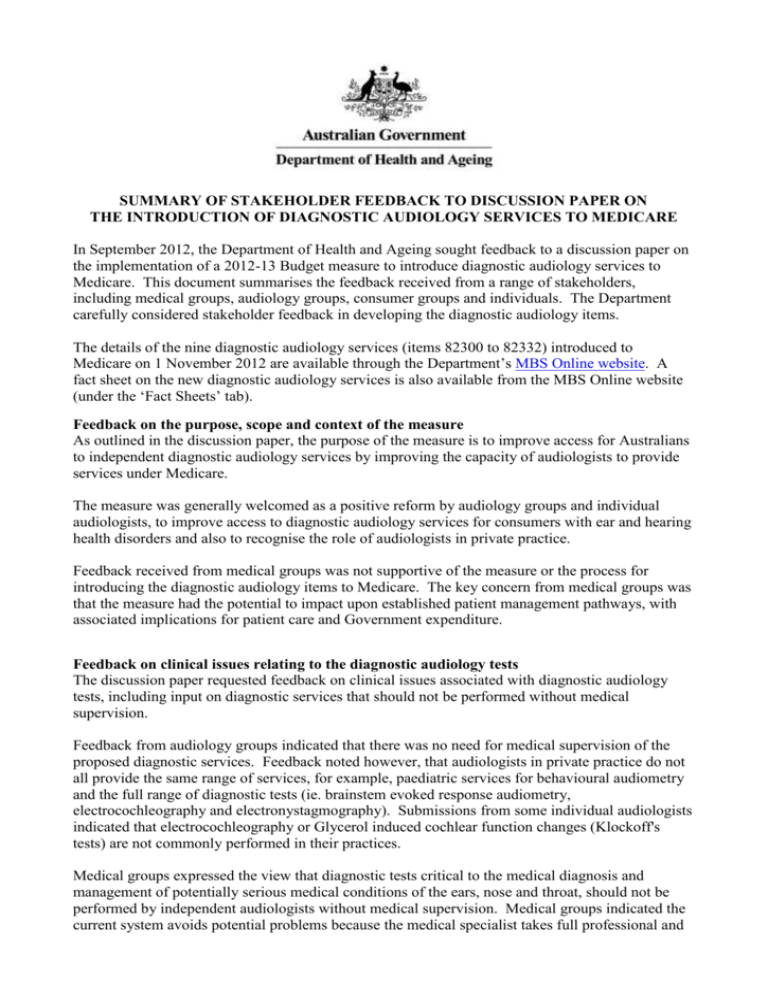
SUMMARY OF STAKEHOLDER FEEDBACK TO DISCUSSION PAPER ON THE INTRODUCTION OF DIAGNOSTIC AUDIOLOGY SERVICES TO MEDICARE In September 2012, the Department of Health and Ageing sought feedback to a discussion paper on the implementation of a 2012-13 Budget measure to introduce diagnostic audiology services to Medicare. This document summarises the feedback received from a range of stakeholders, including medical groups, audiology groups, consumer groups and individuals. The Department carefully considered stakeholder feedback in developing the diagnostic audiology items. The details of the nine diagnostic audiology services (items 82300 to 82332) introduced to Medicare on 1 November 2012 are available through the Department’s MBS Online website. A fact sheet on the new diagnostic audiology services is also available from the MBS Online website (under the ‘Fact Sheets’ tab). Feedback on the purpose, scope and context of the measure As outlined in the discussion paper, the purpose of the measure is to improve access for Australians to independent diagnostic audiology services by improving the capacity of audiologists to provide services under Medicare. The measure was generally welcomed as a positive reform by audiology groups and individual audiologists, to improve access to diagnostic audiology services for consumers with ear and hearing health disorders and also to recognise the role of audiologists in private practice. Feedback received from medical groups was not supportive of the measure or the process for introducing the diagnostic audiology items to Medicare. The key concern from medical groups was that the measure had the potential to impact upon established patient management pathways, with associated implications for patient care and Government expenditure. Feedback on clinical issues relating to the diagnostic audiology tests The discussion paper requested feedback on clinical issues associated with diagnostic audiology tests, including input on diagnostic services that should not be performed without medical supervision. Feedback from audiology groups indicated that there was no need for medical supervision of the proposed diagnostic services. Feedback noted however, that audiologists in private practice do not all provide the same range of services, for example, paediatric services for behavioural audiometry and the full range of diagnostic tests (ie. brainstem evoked response audiometry, electrocochleography and electronystagmography). Submissions from some individual audiologists indicated that electrocochleography or Glycerol induced cochlear function changes (Klockoff's tests) are not commonly performed in their practices. Medical groups expressed the view that diagnostic tests critical to the medical diagnosis and management of potentially serious medical conditions of the ears, nose and throat, should not be performed by independent audiologists without medical supervision. Medical groups indicated the current system avoids potential problems because the medical specialist takes full professional and legal responsibility for the equipment and test methodology, the test quality and safety and the use of test findings for medical interpretation, a medical report and advice about diagnosis, further investigations and medical management. Feedback was also received that some of the proposed diagnostic tests carry clinical risks, such as extra-tympanic electrocochleography and caloric testing, which are procedures associated with symptoms including pain, nausea, vomiting, prolonged or permanent tinnitus and conditions such as ear infection, tympanic membrane perforation and ear canal trauma. Feedback on Audiologist requirements for Medicare eligibility Feedback from audiology groups indicated the existing Medicare eligibility requirements were suitable and sufficient to apply to audiologists for the provision of the diagnostic services under the measure. Stakeholders were also invited to provide feedback on any other regulatory issues pertaining to the safety and quality issues under this measure, such as insurance arrangements, equipment and continuing professional development. Feedback from a medical group suggested consideration of shared care arrangements between medical specialists and audiologists, in preference to independent private practice audiology, to support collaboration and avoid fragmenting patient care. A consumer group also suggested the measure may present an opportunity for peak audiology bodies to identify gaps in training and facilitate professional development in diagnostic audiology practice for audiologists wanting to access the new Medicare items. Feedback on requesting and reporting arrangements Requesting practitioners As outlined in the discussion paper, ENT specialists bill the majority of services under items 11300 to 11339, however services are also billed by specialists and/or consultant physicians in other medical specialty areas, including neurology, general surgery and paediatric medicine. The discussion paper outlined a key consideration for the measure was that requests for diagnostic audiology services are made by specialists who are trained in the interpretation and in the clinical significance of diagnostic audiology results. Stakeholders were invited to provide comments on which medical specialists and consultant physicians should be able to request diagnostic audiology services under the new items. Feedback from audiology groups indicated there should be no restriction on medical specialists and consultant physicians being able to request diagnostic audiology services. Whilst acknowledging that diagnostic tests are typically requested by ENT specialists, neurologists and paediatricians, feedback from audiologists outlined that a range of specialists identify diagnostic audiology as clinically relevant and that these practitioners should be able to request diagnostic tests based on their clinical judgment and expertise. Examples included: Accident and emergency specialists and scenarios of sudden hearing loss or sudden onset tinnitus; Psychiatrists or geriatricians needing audiological diagnoses to help differentiate communication breakdown arising from hearing loss or confusion due to other disorders; Oncologists and radiologists to evaluate ototoxicity secondary to treatment; Endocrinologists for holistic management of patients with hearing loss associated with diabetes; Cardiovascular or rehabilitative physicians managing patients who have had a stroke and subsequent hearing loss; and Ophthalmologists investigating late adult onset retinitis pigmentosa and associated reported hearing loss. In relation to these examples, the need for timely access to diagnostic audiology services was raised as an issue, due to long waiting times for ENT services and minimal or no access in rural and remote locations. Feedback from groups representing ENT specialists indicated that changing current arrangements for diagnostic audiology could impact upon established patient management pathways and fragment patient care. Feedback from these groups emphasised that oversight from an appropriate medical specialist or physician (most notably an otolaryngologist) was important for medical interpretation of diagnostic tests, including their full clinical implications, and appropriate medical management. Whilst medical groups were opposed to the measure, feedback was received on parameters for the measure if it proceeded, that requests for specific diagnostic tests should be made by either ENT specialists and for some services, neurologists. In relation to the interpretation of diagnostic audiology test results, stakeholder feedback reflected the different perspectives and roles of audiologists and medical specialists. Audiologists indicated their role is to select an appropriate test battery based on case history and initial findings, interpret test results and integrate findings to determine the type and degree of hearing and/or balance disorders, and their associated site of lesion. An audiology group indicated this ‘audiological diagnosis’ may assist medical specialists to identify or rule out underlying pathologies of the ears and brain and further, that the ‘audiological diagnosis’ is used to underpin non-medical rehabilitation. In the context of the Otolaryngology items listed for medical practitioners under Medicare, feedback from medical groups noted that indications for both ordering and interpreting tests are sometimes absolute and sometimes relative and therefore, medical training, expertise and experience needs to be applied. Feedback on the measure emphasised the role of medical practitioners in considering hearing loss and its impact within the whole patient, for medical diagnosis, treatment and management. Form of request In relation to the form of the written request, comments were sought from stakeholders on whether the requesting specialist should detail the specific diagnostic tests (by service) to be performed, or in the case of a more general request, whether audiologists should have a degree of clinical judgement to select and perform an appropriate battery of diagnostic tests. A range of feedback was received from audiology groups and individual audiologists on this issue. A common view from the audiology profession was that the requesting specialist should have the option to request specific diagnostic tests but this should not be mandatory and general requests for ‘audiological assessment’ based upon the clinical indications should be acceptable (eg. to assess hearing or balance, to investigate cochlear implant function, or to assess and manage tinnitus). Feedback from audiologists strongly expressed that their professional role is to select, interpret, and integrate findings to arrive at an audiological diagnosis, using clinical standards and professional judgement. Under a general request for audiological assessment, submissions indicated that an audiologist would select a battery of tests which are clinically relevant for a patient with due regard for their age, clinical history and any known previous assessment. Some submissions indicated that the form of the request often depended on the type of medical specialist and their level of understanding of diagnostic audiology tests. Some submissions from audiologists outlined they currently respond to specific requests from ENT specialists and that in performing this work, it was important to have strong professional relationships and good communication processes to seek clarification on issues or problems. Reporting arrangements The feedback received on the proposed responsibilities of audiologists in performing diagnostic audiology services outlined it was reasonable and consistent with accepted clinical and business practice for audiologists to: perform diagnostic test/s in accordance with a written request; provide a copy of diagnostic audiology test result/s and relevant comments to the requesting specialist within seven (7) days from the date of service; and retain the written request from the specialist for a period of 24 months from the date of service. Feedback on service requirements and restrictions The draft service requirements for the new diagnostic audiology items were generally supported as being reasonable by audiology stakeholders, with one exception. The discussion paper proposed that the diagnostic tests should not be used for the specific purpose of fitting or modifying a hearing aid. Feedback from audiologists indicated that this proposed restriction was confusing, flawed and unnecessary, as a secondary outcome of assessment could be that a patient goes on to require hearing rehabilitation, a hearing aid or implantable hearing technology. In relation to clinical pathways for people with hearing loss, feedback also noted there are some circumstances in which a patient is referred by a general practitioner to an ENT specialist for medical evaluation and advice about hearing aids. Restrictions - timing of re-evaluation Comments were sought from stakeholders on a proposed restriction that any re-evaluation of a patient will only be claimable under Medicare when a written request is separately issued by an eligible specialist (ie. audiologists cannot re-evaluate patients under the new items at their discretion). As outlined in the discussion paper, the purpose of the restriction is to ensure that the measure does not impact current clinical links and that the relevant medical specialist remains responsible for the medical diagnosis, treatment and management of the patient. Feedback from both consumer and audiology groups indicated that to improve timely and efficient access to audiological assessment services, audiologists should have the capacity to re-evaluate or reassess patients without a separate request from a specialist. Suggestions were received that ENT specialists should be able to request a specified number of assessment services in a specified period, or alternatively to issue an annual referral for ongoing assessments. Examples were provided where periodic re-evaluation might be appropriate, including re-evaluation of children with suspected fluctuating hearing loss and otitis media, patients requiring assessment pre and post ENT surgery, periodic mapping of cochlear implants, monitoring of hearing levels and/or balance function where ototoxic medications are being administered, or monitoring of cases of known progressive hearing loss. Restrictions – use of new items with existing Otolaryngology services/items Feedback indicated that it was appropriate for a restriction to be put in place preventing Medicare claims for the new diagnostic audiology item/s and the Otolaryngology item/s, if the same diagnostic tests were provided to the same patient on the same day. Feedback on fees and billing The discussion paper outlined that new diagnostic audiology items will have a Schedule Fee set at 80 per cent of the Schedule Fee for existing items claimed by medical practitioners. Some feedback indicated it was inequitable for a diagnostic test to be remunerated at one rate when billed by a medical practitioner and a lower rate when billed by an audiologist. Comments were also provided that the Schedule Fees are low and do not reflect the real costs of providing and maintaining a diagnostic audiological facility, including staff and equipment expenses, particularly for audiologists who offer paediatric services. Feedback relating to contemporary clinical practice A range of feedback was received that was outside the scope of the measure relating to existing Medicare items, suggestions for new Medicare services and issues relating to contemporary clinical practice. Some common themes and issues are outlined below. An issue raised by number of audiologists for consideration was appropriate recognition and fee structure under Medicare for audiologists working in private practice who choose to offer paediatric services. Feedback indicated that behavioural audiometric assessment of infants and children requires additional resources (physical and workforce) and in many cases, multiple consultations. Examples were provided detailing the resources needed for behavioural assessment through visual reinforcement audiometry, visual reinforcement orientation audiometry, play audiometry and speech audiometry procedures. Feedback from audiologists on MBS item 11332 for ‘Oto-acoustic emission audiometry’ was the conditions under which this item can be claimed are too prescriptive. It was suggested that the conditions on the item be reviewed, noting the cost of equipment, the clinical value of the test and the broader range of uses for the test. Feedback was received from one audiology group that Medicare arrangements should better reflect modern audiological practice by listing items for Cervical VEMP, Ocular VEMP, Cortical Auditory Evoked Responses, Middle Latency Auditory Evoked Responses, Steady State Responses, Distortion Product Oto-acoustic Emissions for children and adults, Auditory Processing Assessment, Tinnitus Assessment and Dix Hallpike with VNG recording. Feedback was received that some audiologists perform diagnostic tests that were not considered under the measure, including services relating to items 11024 and 11027 for electrophysiological (ASSR) assessments, items 11015 and 11021 for Cervical and Ocular VEMP, and item 11205 for rotational chair testing. Comments were received from an audiology group expressing the view that differential funding for ‘implantable verses wearable’ devices under Medicare means that patients may be opting for cochlear implants when they could benefit from hearing aids. Suggestions were put forward for Medicare to fund audiology services associated with hearing device fitting, to help unbundle device costs and support rehabilitative decisions based on clinical factors, rather than financial factors. An issue proposed by audiology and consumer groups for future consideration is the capacity for audiologists to be involved in e-health initiatives, such as telehealth and teleaudiology services to patients who live in rural and remote locations, and support for the introduction the Personal Controlled Electronic Health Records (PCEHR). Feedback was received that new measure may present an opportunity for reformed pathways to the Government’s Hearing Services Program in the future, if a patient has already been assessed through diagnostic audiology Medicare services. Comments were also received from audiologists that consideration should be given to changes that facilitate primary ear health treatment and management at the earliest opportunity, such as Medicare items for audiological assessments by audiologists on request from a general practitioner, and the capacity for audiologists to refer patients directly to ENT specialists for investigation and intervention.
